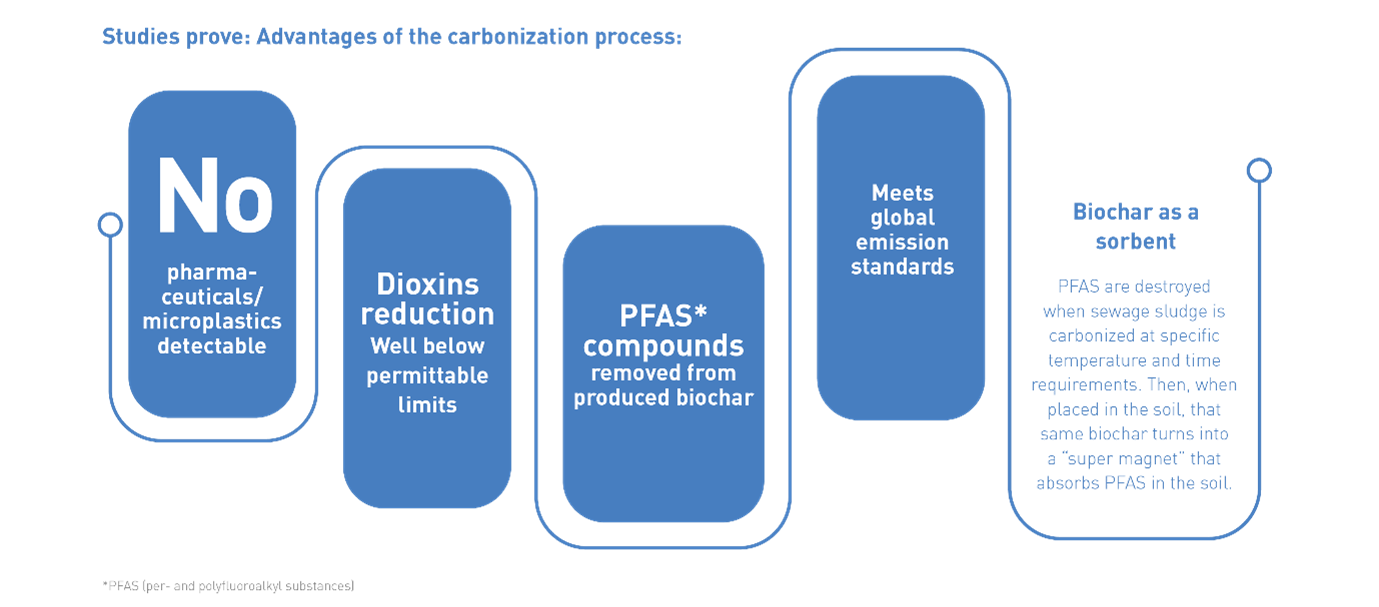Revolutionising Waste: How PYREG’s Pyrolysis/Carbonisation System Tackles PFAS and Transforms Complex Waste into Biochar
)
CFE is proud to be the exclusive UK partner of PYREG GmbH, who offers innovative pyrolysis and carbonisation technology. PYREG's pyrolysis technology transforms various waste streams into valuable biochar.
In the UK, an average:
-
3.9 million tonnes of farm animal manure & slurry
-
1 million tonnes of sewage sludge
-
35.5 million tonnes of industrial waste, a proportion of which will be carbon based
are sent to landfill or spread on farmland per year.
PYREG offers one of the only technologies capable of processing not just simple waste streams (such as wood waste) into biochar, but also complex waste streams like manure, anaerobic digestion (AD) digestate, industrial and sewage sludge.
Critically, the Environmental Protection Agency (EPA) has validated that PYREG’s pyrolysis technology also effectively destroys PFAS.
PFAS are dubbed ‘forever chemicals’ because they’re the most persistent synthetic chemicals to date. They hardly degrade in the natural environment, and have been detected in the blood and breastmilk of people and wildlife globally. PFAS tend to contaminate water, food chains, and soils at trace levels for generations.
The chemicals are linked to a range of serious health problems like cancer, liver disease, kidney issues, high cholesterol, birth defects and decreased immunity. After decades of use, PFAS are ubiquitous in soils, groundwater and surface water.
In the US, untreated ‘sludge’ (a by-product of wastewater treatment combining human and industrial waste) used on farmland, contained PFAS which highly contaminated its crops or water. This has led to farmers falling ill; livestock dying; drinking-water becoming polluted; contaminated meat being sold to the public; and crops becoming tainted.
Pyrolysis and carbonisation has been proven to destroy PFAS in industrial and sewage sludge. At the Fårevejle wastewater treatment in Denmark, sewage sludge pyrolysed at a temperature of 650 °C and a residence time of more than 3 minutes, has showed to eliminate all 7 PFAS compounds previously detected in the feedstock.

The process of pyrolysis and carbonisation not only destroys existent PFAs in the waste stream, but the biochar produced from sludge also acts as a ‘super magnet’ that absorbs PFAS when applied to soil. This biochar ‘sorbent’ binds existent contaminants in the soil, likely due to its high surface area, porosity and high carbon content.
Carbonisation of sewage and industrial sludge into biochar offers a more sustainable waste management alternative to landfill or incineration. This is because it will remove much of the PFAS contaminants present in the sludge and produce a sorbent for PFAS when used on soil.
PYREG systems are compact, decentralised recycling technologies designed to integrate into existing infrastructures. They use a dry carbonisation process where waste is degassed and carbonized at 500-700°C instead of being incinerated. This process generates up to 4.8 million kWh of excess thermal energy per year, which can be used on-site or supplied to local heating grids. PYREG systems can process both sewage sludges and industrial sludges effectively.
Click to learn more: Pyrolysis | Low Carbon Technology | CFE
Join CFE at the Energy, Fuels & Decarbonisation Expo (EFD Expo) for a deep dive into pivotal topics in the Energy Sector.
As part of ESS Expo, the event features over 200 sessions in key sectors like Net Zero, Renewable Energy, Carbon Capture, Decarbonisation, and Hydrogen Energy. It's an essential platform for those keen to engage with the latest sustainable trends and innovations. Discover the future of environmental solutions at the show.




